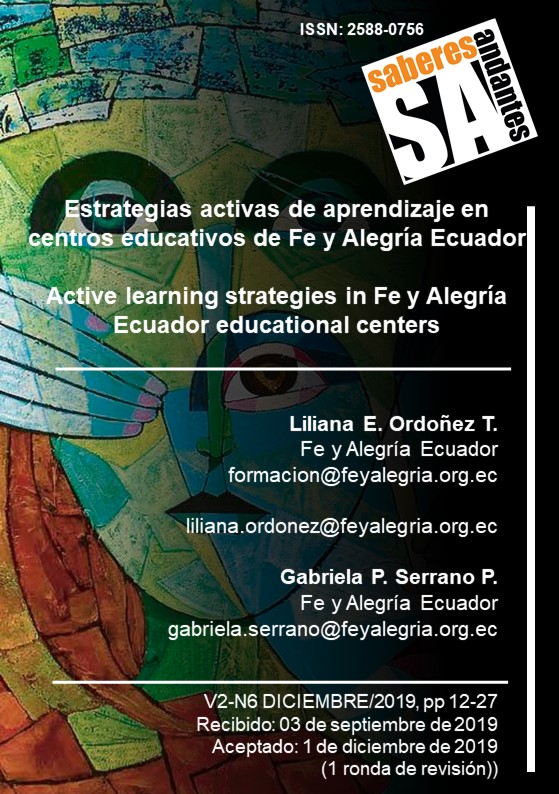Active learning strategies in educational centers of Fe y Alegría Ecuador
DOI:
https://doi.org/10.53387/sa.v2i6.46Keywords:
active strategies, teaching - learning, educational innovationAbstract
The aim of this paper is to evaluate the application of active teaching strategies in the twenty-one elementary schools of Fe y Alegría Ecuador, whose teachers have participated in training, accompaniment and followup processes from a multi-intelligence development approach. The study is qualitative where information provided has been gathered from interviews with focus groups, observation of classes, analysis of learner and teacher and reflections in grassroots groups. It has been shown that most of the teachers has pursued active strategies in the teaching and learning processes, among which there are the use of palettes, thinking routines, thinking skills and comprehension projects, among others. Teachers are in a phase of appropriation of such strategies, so it is natural that they show strengths and weaknesses in the application, making it necessary to maintain a dynamic for permanent reflection on the practice of such strategies based on the improvement in the use of them.
Downloads
References
Cardelli, J. y Duhalde, M. (2001). Formación docente en América latina. Una perspectiva políttico pedagógica. Barcelona: Cuadernos de Pedagogía.
Diaz B., F. (2010). Los profesores ante las innovaciones curriculares. Revista Iberoamericana de Educación Superior, 37-57.
Diaz-Barriga, F. (2012). Reformas curriculares y cambio sistémico: una articulación ausente pero necesaria para la innovación. Revista Iberoamericana de Educación Superior, pp 23-40.
Domenech, F. (2001). Desarrollo y apendiaje de la personalidad. Obtenido de Mi actividad profesional en la universidad Jaume I: https://www3.uji.es/~betoret/Instruccion/Aprendizaje%20y%20DPersonalidad/Curso%2012-13/Apuntes%20Tema%205%20La%20ensenanza%20y%20el%20aprendizaje%20en%20la%20SE.pdf
Fe y Alegria. (2016). Innovación en el aula. Estrategias metodológicas de lectura y expresión. Quito: Fe y Alegría.
Fe y Alegría. (2016). Una pedagogía de educación popular basada en destrezas. Quito: Fe y Alegría.
Gardner.H. (2012). Inteligencias múltiples. La teoría en la práctica. Barcelona: Paidós.
Hersh, R. y. (1984). El crecimiento moral de Piaget a Kolhberg. España: Narcea.
Montes, L. C. (2017). Análisis de las prácticas docentes: estado del conocimiento en DOAJ y EBSCO (2006 - 2016). CPU-e Revista de Investigación Educativa.
Sarmiento, S. (2007). La enseñanza de las matemáticas y las TIC. Una estrategia de formación permanente. Universitat Rovira I Virgili.
Unesco, Prelac. (2012). Situación educativa de América Latina y el Caribe. Hacia una educación para todos. Chile.

Downloads
Published
How to Cite
Issue
Section
License
Copyright (c) 2019 Saberes Andantes

This work is licensed under a Creative Commons Attribution-NonCommercial-ShareAlike 4.0 International License.
1. Derechos de autor
Las obras que se publican en Saberes Andantes están sujetas a los siguientes términos:
1.1. Saberes Andantes, conserva los derechos patrimoniales (copyright) de las obras publicadas, favorece y permite la reutilización de las mismas bajo la licencia Licencia Creative Commons 4.0 de Reconocimiento-NoComercial-CompartirIgual 4.0, por lo cual se pueden copiar, usar, difundir, transmitir y exponer públicamente, siempre que:
1.1.a. Se cite la autoría y fuente original de su publicación (revista, editorial, URL).
1.1.b. No se usen para fines comerciales u onerosos.
1.1.c. Se mencione la existencia y especificaciones de esta licencia de uso.








